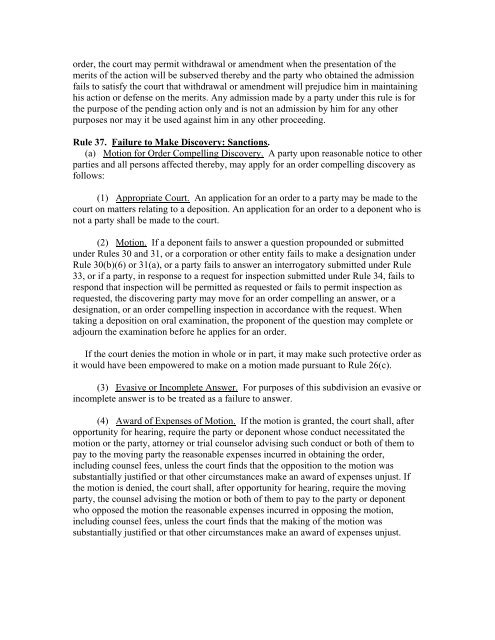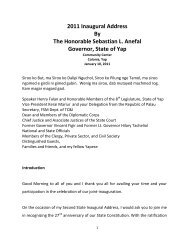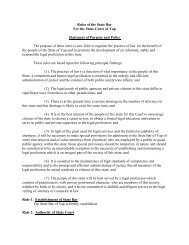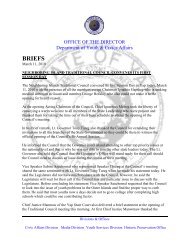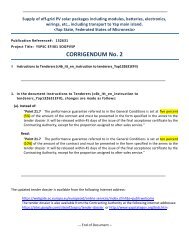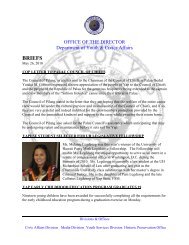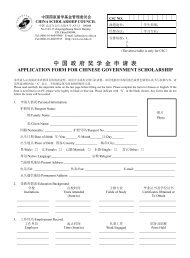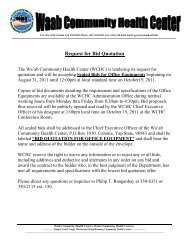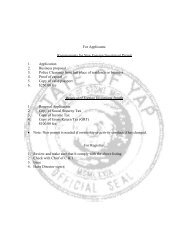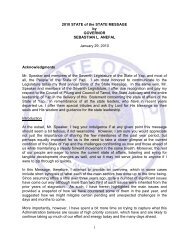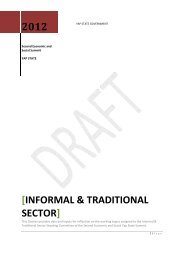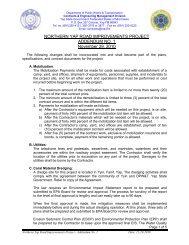RULES OF CIVIL PROCEDURE For the Trial Division of the Yap ...
RULES OF CIVIL PROCEDURE For the Trial Division of the Yap ...
RULES OF CIVIL PROCEDURE For the Trial Division of the Yap ...
You also want an ePaper? Increase the reach of your titles
YUMPU automatically turns print PDFs into web optimized ePapers that Google loves.
order, <strong>the</strong> court may permit withdrawal or amendment when <strong>the</strong> presentation <strong>of</strong> <strong>the</strong><br />
merits <strong>of</strong> <strong>the</strong> action will be subserved <strong>the</strong>reby and <strong>the</strong> party who obtained <strong>the</strong> admission<br />
fails to satisfy <strong>the</strong> court that withdrawal or amendment will prejudice him in maintaining<br />
his action or defense on <strong>the</strong> merits. Any admission made by a party under this rule is for<br />
<strong>the</strong> purpose <strong>of</strong> <strong>the</strong> pending action only and is not an admission by him for any o<strong>the</strong>r<br />
purposes nor may it be used against him in any o<strong>the</strong>r proceeding.<br />
Rule 37. Failure to Make Discovery: Sanctions.<br />
(a) Motion for Order Compelling Discovery. A party upon reasonable notice to o<strong>the</strong>r<br />
parties and all persons affected <strong>the</strong>reby, may apply for an order compelling discovery as<br />
follows:<br />
(1) Appropriate Court. An application for an order to a party may be made to <strong>the</strong><br />
court on matters relating to a deposition. An application for an order to a deponent who is<br />
not a party shall be made to <strong>the</strong> court.<br />
(2) Motion. If a deponent fails to answer a question propounded or submitted<br />
under Rules 30 and 31, or a corporation or o<strong>the</strong>r entity fails to make a designation under<br />
Rule 30(b)(6) or 31(a), or a party fails to answer an interrogatory submitted under Rule<br />
33, or if a party, in response to a request for inspection submitted under Rule 34, fails to<br />
respond that inspection will be permitted as requested or fails to permit inspection as<br />
requested, <strong>the</strong> discovering party may move for an order compelling an answer, or a<br />
designation, or an order compelling inspection in accordance with <strong>the</strong> request. When<br />
taking a deposition on oral examination, <strong>the</strong> proponent <strong>of</strong> <strong>the</strong> question may complete or<br />
adjourn <strong>the</strong> examination before he applies for an order.<br />
If <strong>the</strong> court denies <strong>the</strong> motion in whole or in part, it may make such protective order as<br />
it would have been empowered to make on a motion made pursuant to Rule 26(c).<br />
(3) Evasive or Incomplete Answer. <strong>For</strong> purposes <strong>of</strong> this subdivision an evasive or<br />
incomplete answer is to be treated as a failure to answer.<br />
(4) Award <strong>of</strong> Expenses <strong>of</strong> Motion. If <strong>the</strong> motion is granted, <strong>the</strong> court shall, after<br />
opportunity for hearing, require <strong>the</strong> party or deponent whose conduct necessitated <strong>the</strong><br />
motion or <strong>the</strong> party, attorney or trial counselor advising such conduct or both <strong>of</strong> <strong>the</strong>m to<br />
pay to <strong>the</strong> moving party <strong>the</strong> reasonable expenses incurred in obtaining <strong>the</strong> order,<br />
including counsel fees, unless <strong>the</strong> court finds that <strong>the</strong> opposition to <strong>the</strong> motion was<br />
substantially justified or that o<strong>the</strong>r circumstances make an award <strong>of</strong> expenses unjust. If<br />
<strong>the</strong> motion is denied, <strong>the</strong> court shall, after opportunity for hearing, require <strong>the</strong> moving<br />
party, <strong>the</strong> counsel advising <strong>the</strong> motion or both <strong>of</strong> <strong>the</strong>m to pay to <strong>the</strong> party or deponent<br />
who opposed <strong>the</strong> motion <strong>the</strong> reasonable expenses incurred in opposing <strong>the</strong> motion,<br />
including counsel fees, unless <strong>the</strong> court finds that <strong>the</strong> making <strong>of</strong> <strong>the</strong> motion was<br />
substantially justified or that o<strong>the</strong>r circumstances make an award <strong>of</strong> expenses unjust.


